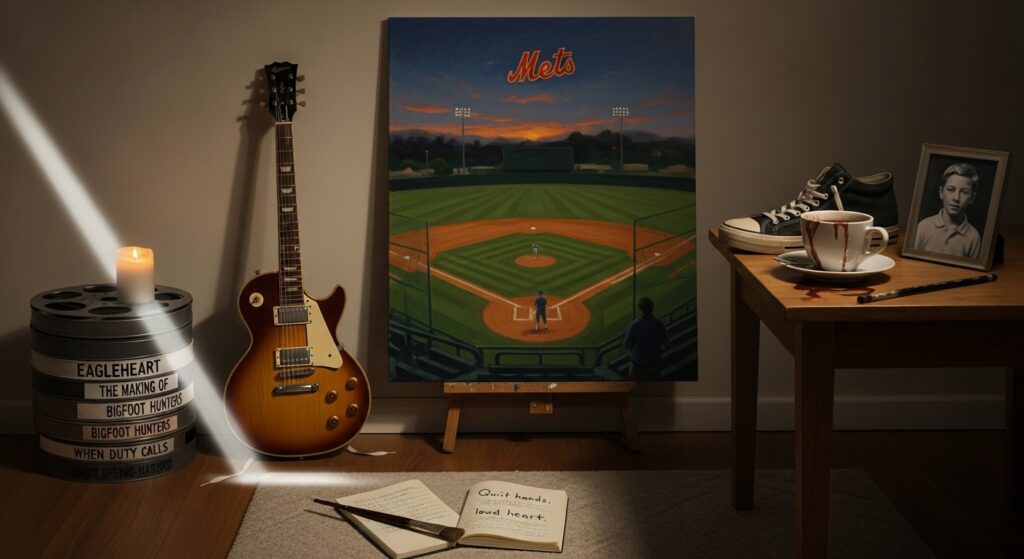Christian Gutkowski might not have been a household name, but his influence behind the scenes shaped stories that millions saw. In a field that often celebrates on-screen talent, Christian embodied the quiet, dedicated artistry of a second unit director and assistant director — roles essential to bringing television and film to life. This article traces his journey from his upbringing in Cold Spring Harbor, New York, through his career in Los Angeles, and into the legacy he left behind.
Early Life in Cold Spring Harbor, New York

Christian Gutkowski was born around 1974, in Cold Spring Harbor, New York, a community on Long Island known for its scenic coastal beauty and intellectually vibrant atmosphere.
Growing up in this environment likely nurtured his creative sensibilities: the calm of suburban life paired with proximity to the dynamic arts culture of New York City.
Though detailed public records of his early childhood are limited, his later pursuits — filmmaking, music, visual arts — suggest a person attuned to both technical and emotional expression. Friends describe him as thoughtful, generous, and deeply curious about how stories are told.
Education at Boston College: Where Vision Met Craft
Christian’s academic journey led him to Boston College, where he honed his creative instincts and developed a foundation for his future in entertainment.
While specific details of his major are not widely documented, sources suggest he studied in a media- or communications-related field. It was in college that his interest in film production crystallized — Boston College’s liberal arts environment provided both structure and freedom for Christian to explore his passions.
During his time there, he likely engaged with student film projects, collaborated with peers on creative endeavors, and absorbed both the artistic and managerial aspects of storytelling. These experiences laid the groundwork for his later roles behind the camera.
Moving to Los Angeles: Chasing a Dream
After graduating, Christian made the pivotal move to Los Angeles — the beating heart of the entertainment industry. This transition is common for aspiring filmmakers, but it’s also fraught with challenges: fierce competition, long hours, and the struggle to break into major productions.
Why Los Angeles?
- Access to major studios and production companies
- Proximity to industry professionals and networking opportunities
- A hub for both television and film work
For Christian, this move demonstrated not just ambition, but commitment. He was ready to trade familiarity for the risk and reward of working in Hollywood, a decision that would define his professional life.
Breaking into Filmmaking: Early Career & Milestones

Christian didn’t jump straight into big-budget projects or headline roles. Instead, he built his career by working in the production department, steadily gaining experience and trust.
First Roles & Mentorship
- Production Assistant / Additional Crew: According to IMDb, Christian’s initial credits include “additional crew” roles, giving him hands-on exposure to set operations.
- Learning the Ropes: These early years taught him about logistics, scheduling, and the importance of every crew member. Many in production are mentored by more experienced ADs and assistants; Christian likely absorbed not just technical skills, but also the organizational discipline and people management essential to directing second units.
These formative experiences shaped his work ethic and built the foundation for his later, more specialized roles.
Rising as a Second Unit Director and Assistant Director
Christian’s true professional identity emerged when he took on more specialized responsibilities. He’s often credited on IMDb as a Second Unit Director or Assistant Director, a dual designation that reflects his versatility and technical mastery.
What Do These Roles Actually Mean?
To appreciate Christian’s contributions, it’s helpful to understand what second unit directors and assistant directors do:
| Role | Key Responsibilities |
|---|---|
| Second Unit Director | Oversees the second camera unit, captures supplementary footage (e.g., establishing shots, action sequences, B-roll), ensures visual consistency with the main unit. |
| Assistant Director (AD) | Manages logistics, scheduling, crew coordination, and helps execute the director’s vision. Often oversees safety, timing, and day-to-day production operations. |
These positions require a rare mix of creative vision and organizational discipline. A second unit director must ensure that the footage integrates seamlessly with the main narrative, while an AD must communicate within a large team to keep things running smoothly.
Christian’s reputation among colleagues emphasized his strong leadership, calm problem-solving, and technical insight — qualities that made him vital to any production.
Career Highlights: Projects That Defined His Journey
Christian’s filmography may not be widely publicized, but his work speaks volumes. Here are some of the notable projects where he contributed as a Second Unit Director or Assistant Director.
Television Work
Good Trouble (Freeform)
- Christian worked on Good Trouble, the Freeform spin-off of The Fosters.
- His role involved overseeing second-unit crews and coordinating complex shoots that likely included location work, pick-up shots, and scenes that didn’t require the primary cast.
- In Season 5, Episode 4, the show paid tribute to him: “In loving memory of Christian Gutkowski” appeared in the credits.
- According to reports, he contributed to roughly 19 episodes of Good Trouble.
Eagleheart
- He worked on Eagleheart (2011), a comedy series on Adult Swim.
- This show’s tone (action-comedy) required nimble coordination — comedic timing, stunts, improvisation — showcasing Christian’s ability to adapt to different genres.
Film & Short Projects
The Making of the Bigfoot Hunters
- A short film where Christian is credited in a second unit / assistant capacity.
- Working on a film like this often involves documentary-style production, requiring flexibility in shooting schedules and a sensitivity to both natural and constructed scenes.
When Duty Calls
- Another project listed on his IMDb filmography.
- While not much public detail exists about this film, his role underscores his willingness to work on a range of production types.
Provocateur
- A short film credit on his IMDb.
- Short films often allow second unit directors to experiment creatively and hone their visual storytelling in compact formats.
The “Good Trouble” Era: A Defining Chapter
Christian’s most well-known work came through Good Trouble. This series not only resonated with audiences for its storytelling but also benefited from the precision and care behind its production — where Christian played a key role.
Why Good Trouble Mattered
Good Trouble explores timely and complex social themes: race, sexuality, immigration, workplace justice, and more. Its tone is grounded, socially conscious, and intimate, with many scenes shot in Los Angeles locations that required careful second-unit coordination.
Christian’s responsibilities likely included:
- Capturing establishing shots that set the atmosphere for each episode
- Coordinating B-roll and pick-up shots to support narrative continuity
- Managing a secondary crew to free up the main unit to focus on principal cast scenes
- Ensuring visual consistency across episodes and directors
These contributions are often invisible to viewers, but they are critical in making a show feel polished, cohesive, and emotionally authentic.
Behind the On-Screen Tribute
The tribute in Good Trouble Season 5, Episode 4, that reads “In loving memory of Christian Gutkowski” is more than a nod — it’s a powerful acknowledgment of his role in the fabric of the show.
These on-screen memorials are relatively rare, especially for crew members, making this dedication particularly meaningful. It reflects not just professional respect but also the deep personal impact he had on his colleagues.
Creative Life Beyond Filmmaking: Music, Painting & Personal Passions

Christian Gutkowski’s dedication to creativity extended well beyond his role in production. His hobbies and passions offer insight into his character and how he balanced the demands of his career.
Music & Guitar
- He was an avid guitarist, and music was more than a pastime — it was a source of creative rejuvenation.
- For many filmmakers, playing an instrument offers a different kind of flow — one that’s less structured than set life but equally expressive.
Painting & Visual Arts
- Christian was also passionate about painting, which likely complemented his visual storytelling.
- Painting may have given him a way to decompress from the pressure of production, while also influencing his approach to framing, composition, and color when working behind a camera.
Sports Fandom: New York Mets
- He was a devoted New York Mets fan, a detail often mentioned by friends and colleagues.
- The Mets fandom wasn’t just casual — it reflected his loyalty, his connection to his East Coast roots, and his ability to find joy outside of his demanding work life.
Personal Relationships & Generosity
Those who knew Christian personally often highlight his warmth, generosity, and gentle spirit:
“Christian Gutkowski was a friend like none other … He was kind, gentle, generous, thoughtful, funny, quirky … a unique human.” — Kat Marcheski, friend
“He offered me his studio apartment … while I hunted for a new place to live … he was always there … during an extremely uncertain, scary, and emotional time.” — Marcheski on Facebook
These recollections portray someone who saw his professional peers not just as colleagues, but as friends, and who prioritized care and connection.
The Sudden Passing: March 31, 2023
On March 31, 2023, Christian Gutkowski passed away unexpectedly while on set in Los Angeles. He was 49 years old.
What Happened
- According to multiple reports, Christian suffered a cardiac event (likely a heart attack) while at work.
- Colleagues speculated that previous COVID-19 infections might have contributed, though no public medical report confirmed this.
- His friend Valerie Campbell explained that Christian had contracted COVID twice, and some close to him believed the virus may have had long-term effects.
- Another friend, Kat Marcheski, said Christian had a prior health scare and had made lifestyle changes: quitting smoking, improving his diet, and exercising — but tragically, that wasn’t enough to prevent his sudden collapse.
Impact on Immediate Community
His death sent shockwaves through the production teams, especially the Good Trouble family:
- The episode tribute (S5E4) was a deeply emotional moment that highlighted how critical Christian was, not just as a crew member, but as a friend.
- There were likely immediate logistical and emotional repercussions on set: rearranging schedules, managing the grief of colleagues, and planning to honor him properly.
Broader Industry Reflection
Christian’s passing underscored broader concerns in entertainment about crew wellness:
- Long, unpredictable hours, physical stress, and emotional demands are common in film/TV production.
- The industry has increasingly pushed for better health and safety protocols, mental health support, and more sustainable working conditions for crew members.
Legacy: Remembering Christian Gutkowski
Even though Christian was behind the scenes, his legacy radiates through the people he touched and the episodes he helped create. Here’s how his impact continues to be felt.
On-Screen Tribute & Professional Recognition
- The dedication at the end of Good Trouble Season 5, Episode 4 is a lasting acknowledgment of his contribution.
- While he may not have won mainstream industry awards, his true recognition came from colleagues — people who collaborated closely with him and understood the depth of his work.
Mentorship, Collaboration, & Production Values
Christian was known for a collaborative spirit, a calm problem-solving ability, and an openness to mentoring others. These traits leave a legacy that goes well beyond any single credit:
- Crew members who worked with him likely adopted his methods and philosophy.
- The way he balanced logistical rigor with creative thinking continues to serve as a model for second unit directors and ADs.
- His ability to blend technical precision with emotional sensitivity probably improved the quality of scenes he supervised.
Personal Legacy: The Man Behind the Role
Beyond his work, Christian is remembered as:
- A devoted friend and family member: Many spoke of him as a kind, gentle, and deeply caring person.
- An artist at heart: His guitar playing, his paintings, his love for the Mets — these weren’t just hobbies. They were integral parts of who he was.
- A quiet force: He didn’t seek recognition, but his presence was felt profoundly in his community — personally and professionally.
The Broader Picture: Why Christian Gutkowski’s Story Matters
Highlighting Behind-the-Scenes Talent
- Christian’s life is a reminder that television and film are collective art forms. For every actor in front of the camera, there are dozens of crew members whose work is essential.
- By honoring his role, Good Trouble also draws attention to the importance of second unit direction and assistant directing — roles that are too often invisible to audiences.
Inspiring Future Filmmakers & Crew
His journey — from a small Long Island town to Boston College and then to Los Angeles — is a blueprint of determination, artistry, and humility. For aspiring filmmakers, his career shows:
- The value of building from the ground up
- How to balance creative passion with logistical discipline
- That true impact isn’t always about fame — sometimes it’s about consistent, dedicated work
Raising Awareness About Crew Welfare
Christian’s sudden passing also raises important conversation points about physical and mental health in high-pressure jobs:
- The need for regular health screenings
- Better mental health support
- More sustainable working hours
- Protocols to protect those working in demanding behind-the-scenes roles
Conclusion: A Life Well Lived, Behind the Lens
Christian Gutkowski’s story is a testament to the profound influence one individual can have without ever being in the limelight. As a second unit director and assistant director, his fingerprints are all over the fabric of Good Trouble and other projects — not in a flashy way, but in a deeply structural, creative, and humane way.
From his roots in Cold Spring Harbor to his education at Boston College, to his career in Los Angeles, Christian followed his passion with purpose. His life beyond production — as a musician, painter, friend, and Mets fan — reminds us that creatives are multifaceted people with rich inner lives.
Gutkowski sudden passing on March 31, 2023, was a shock, but the tribute paid by Good Trouble and the stories shared by his friends and colleagues ensure he’ll be remembered not just as a technician, but as a person who made a real difference. His legacy lives on — in the episodes he helped craft, in the crew he mentored, and in the kindness he shared.
Christian Gutkowski may have worked behind the camera, but his life and career continue to speak loudly and clearly — proof that some of the most powerful stories are told not on screen, but behind it.



